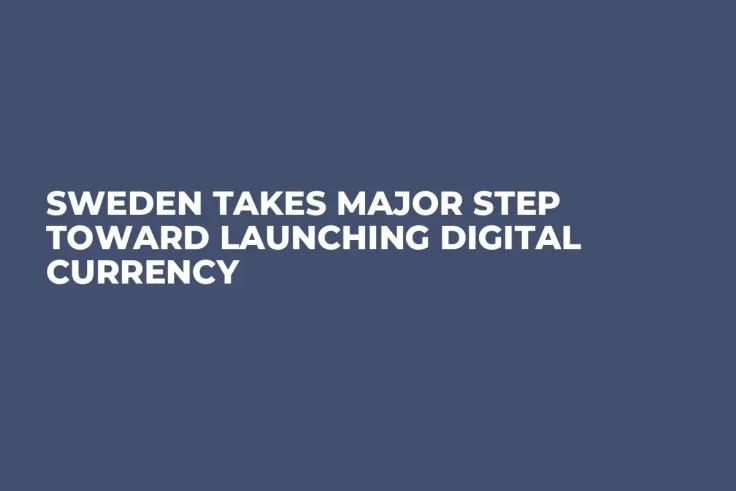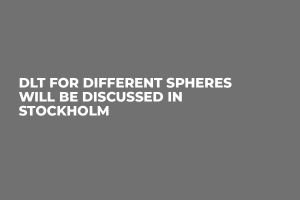Error message
Warning: Undefined variable $alink in
Drupal\cryptocompare\TwigExtension\RemoveSpace::getcard() (line
3802 of
modules/custom/cryptocompare/src/TwigExtension/RemoveSpace.php).
Drupal\cryptocompare\TwigExtension\RemoveSpace::getcard('Per Bolund, the Swedish politician who serves as the minister for financial markets and housing, has announced the launch of a review of the national digital currency, <a rel="nofollow" target="_blank" href="https://www.bloombergquint.com/global-economics/sweden-explores-the-feasibility-of-moving-to-a-digital-currency">Bloomberg reports</a>.
Former leader of the Swedish Moderate Party, Anna Kinberg Batra, will perform the role of special investigator.
Advertisement
Earlier today, Bolund <a rel="nofollow" target="_blank" href="https://twitter.com/bolund/status/1337359320212774914">took to Twitter</a> to congratulate Batra, highlighting her extensive experience:
<blockquote>
Long political experience and solid knowledge from the business world guarantees that she is just the right woman for the job!
HOT Stories
<a rel="nofollow" target="_blank" class="btn btn--light hot__btn" href="/hot-stories" title="Go to Hot stories"> </a>
<a href="https://u.today/crypto-market-review-did-xrp-downtrend-end-shiba-inu-shib-taking-a-beating-bitcoin-btc-safe-above?from=hot-stories" class="hot__col">
Crypto Market Review: Did XRP Downtrend End? Shiba Inu (SHIB) Taking a Beating, Bitcoin (BTC) Safe Above $80,000
</a>
<a href="https://u.today/utoday-crypto-digest-xrp-millionaires-awaken-shiba-inu-buyers-step-in-dogecoin-sees-10782-rise-in?from=hot-stories" class="hot__col">
U.Today Crypto Digest: XRP Millionaires Awaken, Shiba Inu Buyers Step In, Dogecoin Sees 10,782% Rise in Futures Volume
</a>
<a href="https://u.today/scaramucci-get-ready-as-bitcoin-firms-against-falling-gold?from=hot-stories" class="hot__col">
Scaramucci: ‘Get Ready’ as Bitcoin Firms Against Falling Gold
</a>
<a href="https://u.today/xrp-faces-brutal-11348-liquidation-imbalance-what-just-happened?from=hot-stories" class="hot__col">
XRP Faces Brutal 11,348% Liquidation Imbalance: What Just Happened?
</a>
</blockquote>
Just days before officially announcing her new appointment, Batra left the board of directors of Collector Bank AB to avoid a conflict of interest.
Advertisement
Bolund believes that e-krona could have "large consequences" for the entire financial system of the Scandinavian country:
<blockquote>
Depending on how a digital currency is designed and which technologies are used, it can have large consequences for the entire financial system.
</blockquote>
The review is expected to be wrapped up by the end of 2022. <a href="https://u.today/press-releases/dlt-for-different-spheres-will-be-discussed-in-stockholm">card</a>
Advertisement
The most cashless country in the world
Sweden has already made great progress toward developing its own digital currency. In February, Sweden's central bank, Riksbank, <a rel="nofollow" target="_blank" href="https://www.reuters.com/article/us-cenbank-digital-sweden-idUSKBN20E26G">started testing e-krona</a> back in February.
Outpacing China, it is on track to become the very first cashless society in the world by as early as 2023. Over the past decade, the share of those Swedes who use cash has dropped precipitously from 40 percent to just <a rel="nofollow" target="_blank" href="https://sweden.se/business/cashless-society/">nine percent</a>. What is more, only a minuscule one percent of the country's total GDP circulates in the form of cash.
In its <a rel="nofollow" target="_blank" href="https://www.riksbank.se/globalassets/media/rapporter/sa-betalar-svenskarna/2019/engelska/payments-in-sweden-2019.pdf">2019 report</a>, Riksbank pointed out that reluctance to adapt to the trend would ultimately make state-issued money irrelevant:
<blockquote>
If nothing is done, this development will very likely lead to the general public no longer having access to state-issued money, Riksbank money, which is the most secure form of money existing.
</blockquote>
') (Line: 1262)
Drupal\cryptocompare\TwigExtension\RemoveSpace->formatbody(Array) (Line: 54)
__TwigTemplate_75845256f703f5319a38e035b4af7dd9->doDisplay(Array, Array) (Line: 394)
Twig\Template->displayWithErrorHandling(Array, Array) (Line: 367)
Twig\Template->display(Array) (Line: 379)
Twig\Template->render(Array, Array) (Line: 40)
Twig\TemplateWrapper->render(Array) (Line: 53)
twig_render_template('themes/cryptod/templates/field--body.html.twig', Array) (Line: 372)
Drupal\Core\Theme\ThemeManager->render('field', Array) (Line: 436)
Drupal\Core\Render\Renderer->doRender(Array, ) (Line: 204)
Drupal\Core\Render\Renderer->render(Array) (Line: 474)
Drupal\Core\Template\TwigExtension->escapeFilter(Object, Array, 'html', NULL, 1) (Line: 866)
__TwigTemplate_625426e732c5f7a66fde6d628d98a6b2->doDisplay(Array, Array) (Line: 394)
Twig\Template->displayWithErrorHandling(Array, Array) (Line: 367)
Twig\Template->display(Array) (Line: 62)
__TwigTemplate_e934e56c1e459c359b150360c7169113->doDisplay(Array, Array) (Line: 394)
Twig\Template->displayWithErrorHandling(Array, Array) (Line: 367)
Twig\Template->display(Array) (Line: 379)
Twig\Template->render(Array, Array) (Line: 40)
Twig\TemplateWrapper->render(Array) (Line: 53)
twig_render_template('themes/cryptod/templates/node.html.twig', Array) (Line: 372)
Drupal\Core\Theme\ThemeManager->render('node', Array) (Line: 436)
Drupal\Core\Render\Renderer->doRender(Array, ) (Line: 204)
Drupal\Core\Render\Renderer->render(Array, ) (Line: 238)
Drupal\Core\Render\MainContent\HtmlRenderer->Drupal\Core\Render\MainContent\{closure}() (Line: 583)
Drupal\Core\Render\Renderer->executeInRenderContext(Object, Object) (Line: 239)
Drupal\Core\Render\MainContent\HtmlRenderer->prepare(Array, Object, Object) (Line: 128)
Drupal\Core\Render\MainContent\HtmlRenderer->renderResponse(Array, Object, Object) (Line: 90)
Drupal\Core\EventSubscriber\MainContentViewSubscriber->onViewRenderArray(Object, 'kernel.view', Object)
call_user_func(Array, Object, 'kernel.view', Object) (Line: 111)
Drupal\Component\EventDispatcher\ContainerAwareEventDispatcher->dispatch(Object, 'kernel.view') (Line: 187)
Symfony\Component\HttpKernel\HttpKernel->handleRaw(Object, 1) (Line: 76)
Symfony\Component\HttpKernel\HttpKernel->handle(Object, 1, 1) (Line: 58)
Drupal\Core\StackMiddleware\Session->handle(Object, 1, 1) (Line: 48)
Drupal\Core\StackMiddleware\KernelPreHandle->handle(Object, 1, 1) (Line: 191)
Drupal\page_cache\StackMiddleware\PageCache->fetch(Object, 1, 1) (Line: 128)
Drupal\page_cache\StackMiddleware\PageCache->lookup(Object, 1, 1) (Line: 82)
Drupal\page_cache\StackMiddleware\PageCache->handle(Object, 1, 1) (Line: 48)
Drupal\Core\StackMiddleware\ReverseProxyMiddleware->handle(Object, 1, 1) (Line: 51)
Drupal\Core\StackMiddleware\NegotiationMiddleware->handle(Object, 1, 1) (Line: 51)
Drupal\Core\StackMiddleware\StackedHttpKernel->handle(Object, 1, 1) (Line: 704)
Drupal\Core\DrupalKernel->handle(Object) (Line: 18)


 Gamza Khanzadaev
Gamza Khanzadaev Arman Shirinyan
Arman Shirinyan Dan Burgin
Dan Burgin Alex Dovbnya
Alex Dovbnya